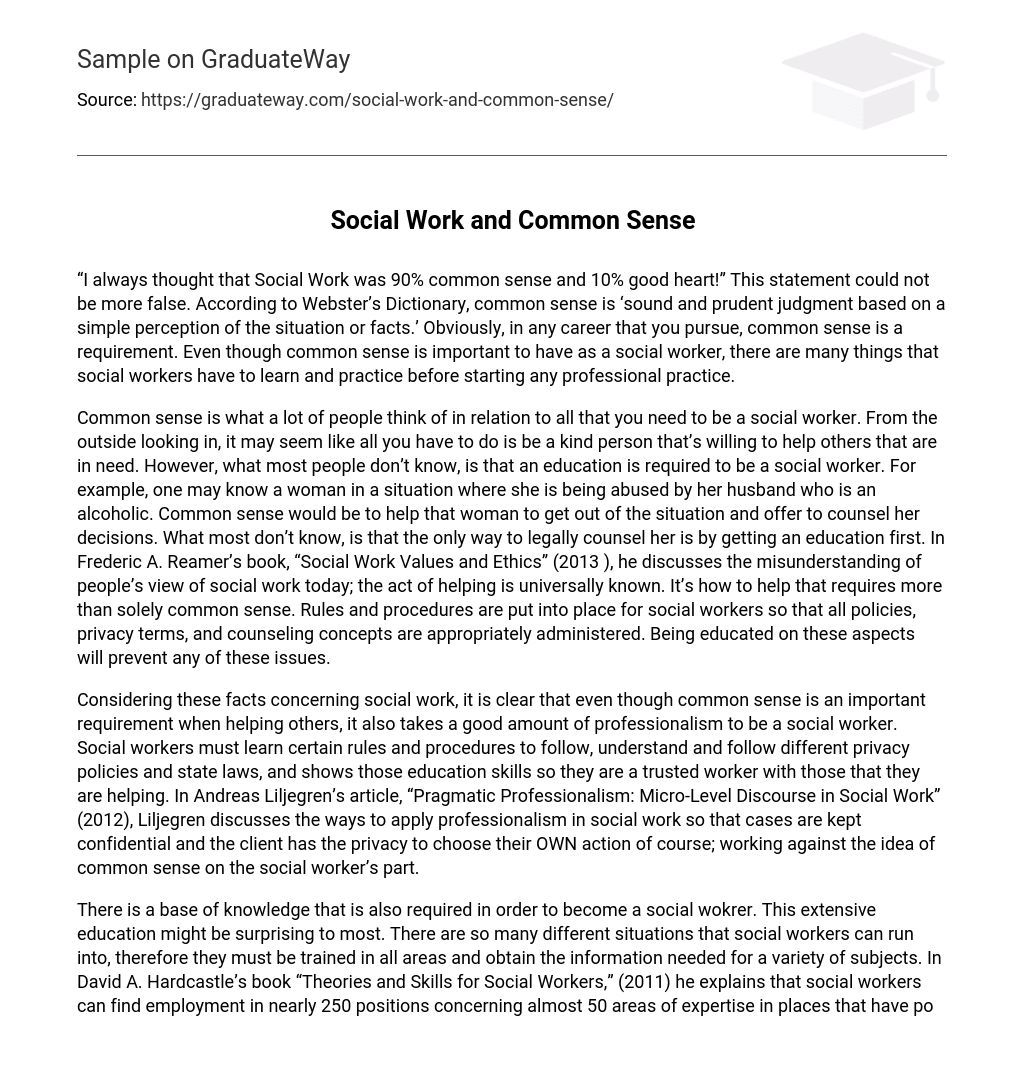“I always thought that Social Work was 90% common sense and 10% good heart!” This statement could not be more false. According to Webster’s Dictionary, common sense is ‘sound and prudent judgment based on a simple perception of the situation or facts.’ Obviously, in any career that you pursue, common sense is a requirement. Even though common sense is important to have as a social worker, there are many things that social workers have to learn and practice before starting any professional practice.
Common sense is what a lot of people think of in relation to all that you need to be a social worker. From the outside looking in, it may seem like all you have to do is be a kind person that’s willing to help others that are in need. However, what most people don’t know, is that an education is required to be a social worker. For example, one may know a woman in a situation where she is being abused by her husband who is an alcoholic. Common sense would be to help that woman to get out of the situation and offer to counsel her decisions. What most don’t know, is that the only way to legally counsel her is by getting an education first. In Frederic A. Reamer’s book, “Social Work Values and Ethics” (2013 ), he discusses the misunderstanding of people’s view of social work today; the act of helping is universally known. It’s how to help that requires more than solely common sense. Rules and procedures are put into place for social workers so that all policies, privacy terms, and counseling concepts are appropriately administered. Being educated on these aspects will prevent any of these issues.
Considering these facts concerning social work, it is clear that even though common sense is an important requirement when helping others, it also takes a good amount of professionalism to be a social worker. Social workers must learn certain rules and procedures to follow, understand and follow different privacy policies and state laws, and shows those education skills so they are a trusted worker with those that they are helping. In Andreas Liljegren’s article, “Pragmatic Professionalism: Micro-Level Discourse in Social Work” (2012), Liljegren discusses the ways to apply professionalism in social work so that cases are kept confidential and the client has the privacy to choose their OWN action of course; working against the idea of common sense on the social worker’s part.
There is a base of knowledge that is also required in order to become a social wokrer. This extensive education might be surprising to most. There are so many different situations that social workers can run into, therefore they must be trained in all areas and obtain the information needed for a variety of subjects. In David A. Hardcastle’s book “Theories and Skills for Social Workers,” (2011) he explains that social workers can find employment in nearly 250 positions concerning almost 50 areas of expertise in places that have populations of 15,000 or more. That just goes to show how diverse the career of social work is and the variety of skills and subjects that are needed to learn. For example, social workers will learn everything from adoption policies to counseling addicts. Yes, it is important to be kind a willing to help the helpless, but it is clear that there is so much to learn and apply to actually be able to help those in need.
In conclusion, the need for social workers is so high. Anyone can have a kind, helpful heart but it takes someone who is quick to think and has the educational background required to complete the tasks in the social work profession. It takes more than just common sense to get put into the situations that social workers do. You have to go through a diversity of classes to learn a diversity of things, have a high sense of professionalism, as well as understand rules and procedures to follow to prevent any discrepancies.
References
- Common Sense. (n.d.). Retrieved from
- https://www.merriam-webster.com/dictionary/common sense
- Liljegran, A. (2012). Pragmatic Professionalism: Micro-level Discourse in Social Work.
- European Journal of Social Work, 295-312.
- Reamer, F. A. (2013). Social Work Values and Ethics. Columbia: Columbia University Press.





